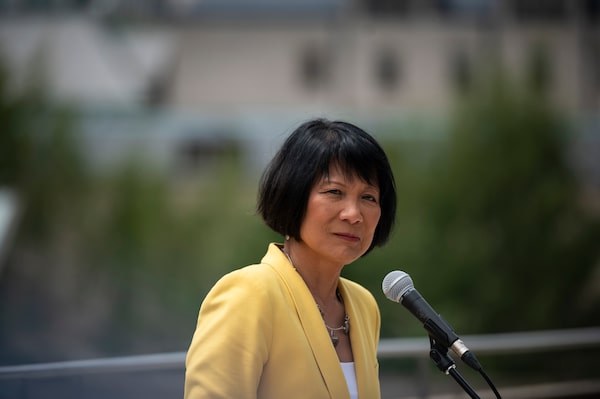
Mayor Olivia Chow delivers her first media availability after being sworn in at Toronto City Hall, on July 12. In regards to the financial pressures facing Toronto, Ms. Chow says 'We’ll do our part, but other levels of government have to step up.'Tijana Martin/The Canadian Press
Toronto is considering new taxes and threatening to halt planned long-term care beds and negotiations on future transit projects without more money from the province, to make headway on a projected $46.5-billion budget shortfall over the next decade.
A long-term financial plan, requested by new Mayor Olivia Chow and released Thursday, outlines recommendations to increase revenues and tackle the shortfall, which the city says includes a $1.5-billion starting pressure for the 2024 budget and $29.5-billion in unfunded capital infrastructure projects.
Canada’s most populous city has been facing increasing fiscal pressure in recent years as a result of higher demands for services as well as reduced transit-system revenues because of COVID-related drops in ridership.
The recommendations, which will be debated by council’s executive committee next week, include measures the city could take on its own in the short term, such as increasing land transfer tax rates for residential properties worth more than $3-million; raising Toronto Parking Authority rates; and introducing a commercial parking levy for non-residential paid and unpaid parking.
These actions, however, wouldn’t even cover half of the projected shortfall, said Paul Johnson, Toronto’s City Manager.
Ms. Chow, who took office last month following a June by-election, said Toronto needs more money and revenue tools from Ottawa and the province as the city has been paying for services that should be the responsibilities of the senior levels of government, including long-term care, social services and childcare.
Without a new funding agreement, the city said it will be unable to operate 978 new planned long-term care beds announced by the province and will need to pause negotiations on future operation and maintenance of provincial priority transit projects, including the planned Ontario Line.
Ms. Chow called the potential pause on long-term care beds “painful” because they are urgently needed but said the city can’t continue racking up costs and asking to be paid back.
“Even if we look at all these revenue tools, we still don’t have enough,” Ms. Chow told reporters. “We’ll do our part, but other levels of government have to step up.”
Freeland rejects Toronto bailout, says Ontario in ‘excellent fiscal position’ to help
Mr. Johnson pointed to a potential municipal sales tax that could apply to purchases of goods and services in the city and bring in upwards of $800-million annually. But this would require approval from the government of Premier Doug Ford, who has frequently called on the city to rein in expenses to address its fiscal crunch.
The province didn’t specifically respond to questions about the municipal sales tax proposal or the city’s threat to pause opening the planned long-term care beds.
Mr. Ford’s spokesperson Caitlin Clark said the government is providing “unprecedented financial support to municipalities” and the province is focused on ensuring taxpayers receive maximum value for their money. Ontario provided Toronto with a requested $235-million to help fill last year’s budget gap, which went unmatched by Ottawa.
“Our government is focused on keeping costs down for people, especially at a time when the cost of living is going up,” Ms. Clark said in a statement on Thursday. “We will continue to work in partnership with the city to build more homes, transit and other critical infrastructure and ensure people continue to have access to the services they need.”
Toronto is facing a budget shortfall of about $840-million in this year’s budget that will be covered through a COVID-19 reserve fund if other levels of government don’t fill the gap. But this will essentially deplete the one-time reserve.
The city’s report didn’t specifically address a plan for property taxes but called on council to consider multiyear budgeting with property tax rates proposed in advance.
Ms. Chow didn’t provide a proposed figure for a property tax increase when asked, but the report said the city could increase property taxes to levels comparable to other municipalities in the region.
Toronto is proposing to continue a 1.5-per-cent annual increase to the city building levy for priority transit and housing projects, which is expected to collect $3.2-billion over the next decade.
 Dustin Cook
Dustin Cook